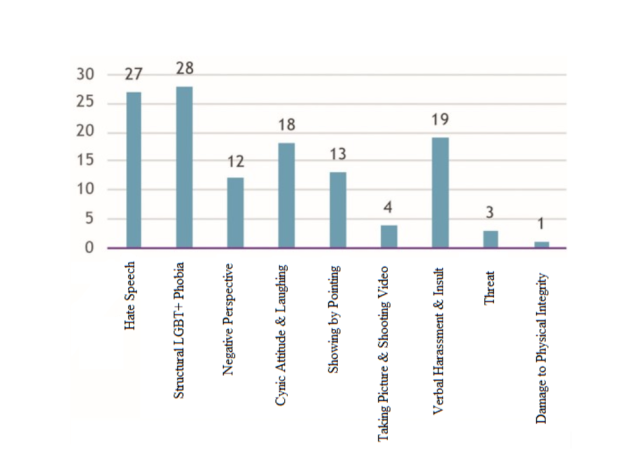Middle East Technical University (METU) Gender and Women’s Studies graduate student and independent trans activist Murat Korkmaz’s study called “Discriminations against LGBT+ Students in Universities of Turkey on the basis of the sample case of METU” has been published.
Source: Discriminations against LGBT+ Students in Universities: METU, A Case Study (Üniversitelerde LGBT+ Öğrencilere Yönelik Gerçekleştirilen Ayrımcılıklar, Vaka Araştırması: ODTÜ) Eda Yılmaz, Pembe Hayat, March 7, 2019
The study “Discrimination against LGBT Students in Universities of Turkey” by independent LGBTI activist Murat Korkmaz was published in February. Korkmaz, who received an undergraduate degree from METU’s Department of Psychology, is currently continuing their graduate education in METU’s Gender and Women’s Studies Program. The study, which has been published in cooperation with the European Union Sivil Düşün (Think Civil) Program and with the support of the European Union, aims to determine the discrimination experienced by LGBTI students in the sample case of METU in the academic year of 2016 – 2017.
The biggest problem: University management
The experience of several tense situations around the LGBTI community gaining official status on campus and their push for gender-neutral bathrooms in 2016-2017 motivated the study. According to Korkmaz: “Especially at these two topics, there was a distinct attitude of the university management towards us. We were not paid attention to, we had to work really hard and to protest in order to be paid attention to. And eventually, we were faced with voting and broken promises. Despite the fact that these demands were supported by hundreds of students (through a petition). In general, I think these processes seriously consumed the time of LGBTI students studying at METU and wore us out. During the second half of the year, we struggled for nearly four months for gender-neutral bathrooms. In addition to the problems we had with the university management, we suffered from several serious attacks on social media during that time. There were some students at METU among the perpetrators of these attacks. In other words, the steps that we tried to take in order to implement structural changes on campus faced a great number of policies of intimidation.”
Korkmaz, who tells us that they has suffered from a lot of discrimination since they started to live openly as trans / nonbinary on campus, says that this is another reason leading to the study:
“2015 and 2016 were the years when I became clear about my sexual identity and made ‘radical’ decisions about what I am not, at least. I started to exist with my Trans/Nonbinary identity openly in a performative sense on the campus. These struggles for existence brought along the most intense discriminations that I suffered during my education at METU. There was not a single day that I spent without being harassed or defined as male by the university personnel and the lecturers during my academic studies, or while in the library or on the quad, despite the fact that I explicitly expressed my trans identity, although it should not be a necessity for me to declare my identity.
To what extent are LGBTI+ people free at the [more] liberal METU?
Korkmaz, who started to report their experiences in addition to those of the people who took part in their research, also has a journal called Akışkan Sayfalar (Fluid Pages) with which they aims for LGBTI+ people to be able to develop and improve themselves.
“Was it true that LGBTI+ individuals didn’t have to hide themselves in METU where they are told to be free? I wanted to see this and to explain this. I tried to show that what we go through are not just personal experiences but are parts of a systematic and structural problem.
I wanted the study so we could demand changes regarding these problems from the university management and all the students of the university, by contacting the lecturers and the administrative staff with whom we can communicate about this topic; because we would have a study in hand, showing and proving the problems LGBTI individuals are struggling with.”
138 Recognized Discrimination Cases
The 25% of the participants in the study stated that they were LGBTI+ individuals, 43% said they were not LGBTI+ individuals, 7% did not want to state their orientation, and the remaining 3% marked the other. 12 of the total 78 participants were interviewed in person and the other 66 filled out an online questionnaire. According to the findings received from the participants, there was a total of 138 recognizable cases of discriminations on the basis of sexual identity and sexual orientation at METU in the 2016-2017 school year. The classification of the cases are as follows: Hate speech, structural LGBTI-phobia, negative perceptions, cynical attitude & laughing, showing by pointing, taking pictures & shooting video, verbal harassment & insults, threats, and physical assault.
Cases

“I don’t want my trans identity to be jammed into one of the female or male identities.”
Korkmaz does not forget to thank Sivil Düşün (Think Civil) that supported the publication of the study. Korkmaz highlights that this support is really meaningful taking into consideration that trans people are neglected in every field and Sivil Düşün’s support is really valuable in terms of regaining their motivation as a person struggling for their rights and studying these rights. Korkmaz adds:
“Firstly, as a citizen of this country, as a graduate of METU, and as a graduate student of METU, I don’t want my trans identity to be jammed and ground into one of the cisgender female and male identities. In addition to ending discrimination, I want real recognition. I need to state that I will continue to issue my demands and follow up on my current demands.
Lastly and most importantly, I hope we as LGBTI people can overcome this and other similar discrimination-based obstacles, which prevent us from receiving education and improving our condition, and that we can create safe environments to ourselves.“